Development of Contemporary Tourism: Analyzing its Impact - Essay
VerifiedAdded on 2023/06/13
|7
|2244
|268
Essay
AI Summary
This essay provides a comprehensive analysis of contemporary tourism, exploring its evolution and the multifaceted impacts it has on economic, environmental, and socio-cultural aspects. The essay highlights both the positive and negative consequences of tourism, such as foreign capital influx, job creation, environmental preservation efforts, and cultural exchange, alongside issues like resource depletion, environmental degradation, and the potential erosion of local traditions. It emphasizes the need for sustainable tourism practices, recommending strategies like reducing carbon emissions, promoting eco-friendly events, and ensuring environmental sustainability through responsible resource management. The essay also addresses the socio-cultural impacts, including improved quality of life and infrastructure development, while acknowledging the risks of cultural homogenization and social disruptions. Ultimately, the essay underscores the importance of balancing economic gains with environmental protection and cultural preservation to ensure the long-term sustainability of the tourism sector.
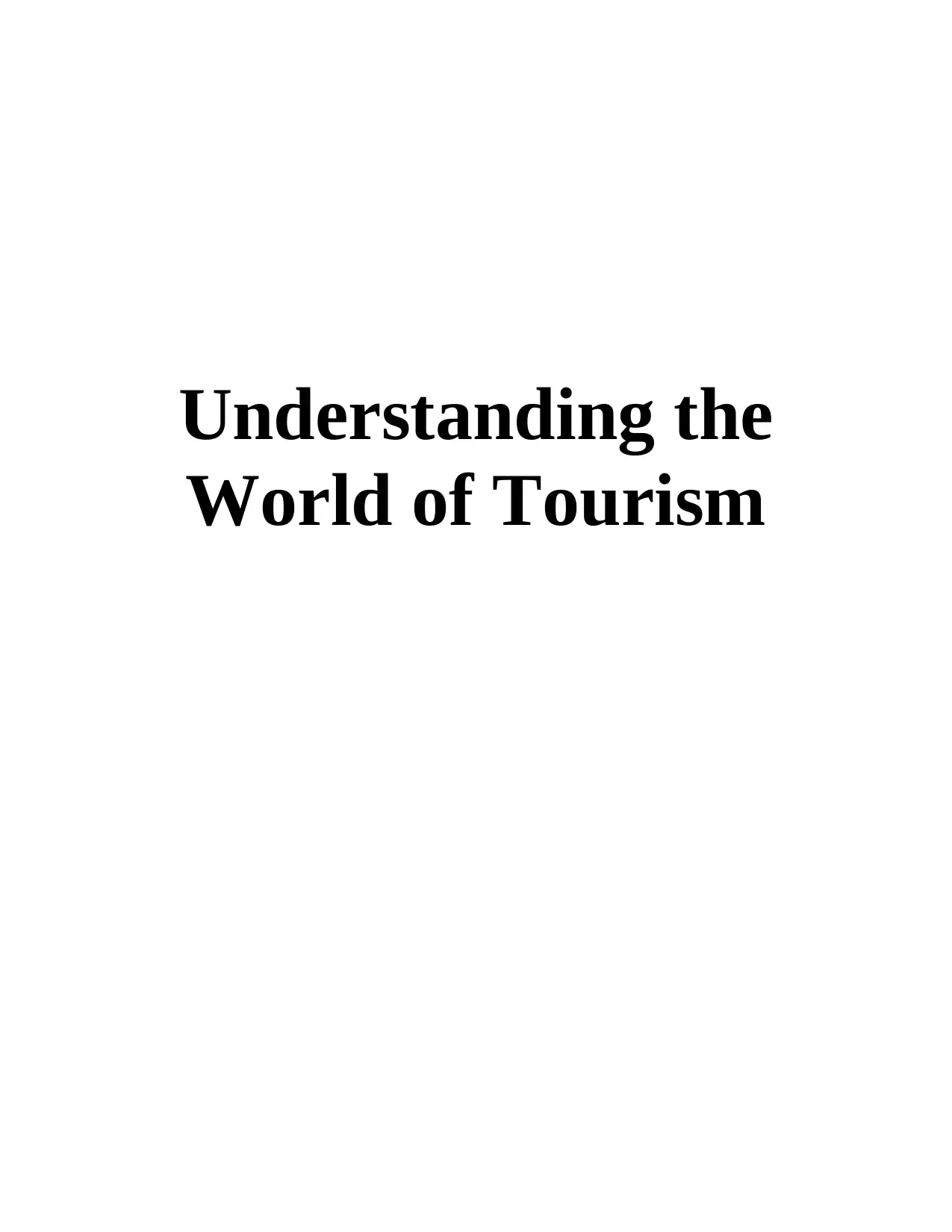
Understanding the
World of Tourism
World of Tourism
Paraphrase This Document
Need a fresh take? Get an instant paraphrase of this document with our AI Paraphraser
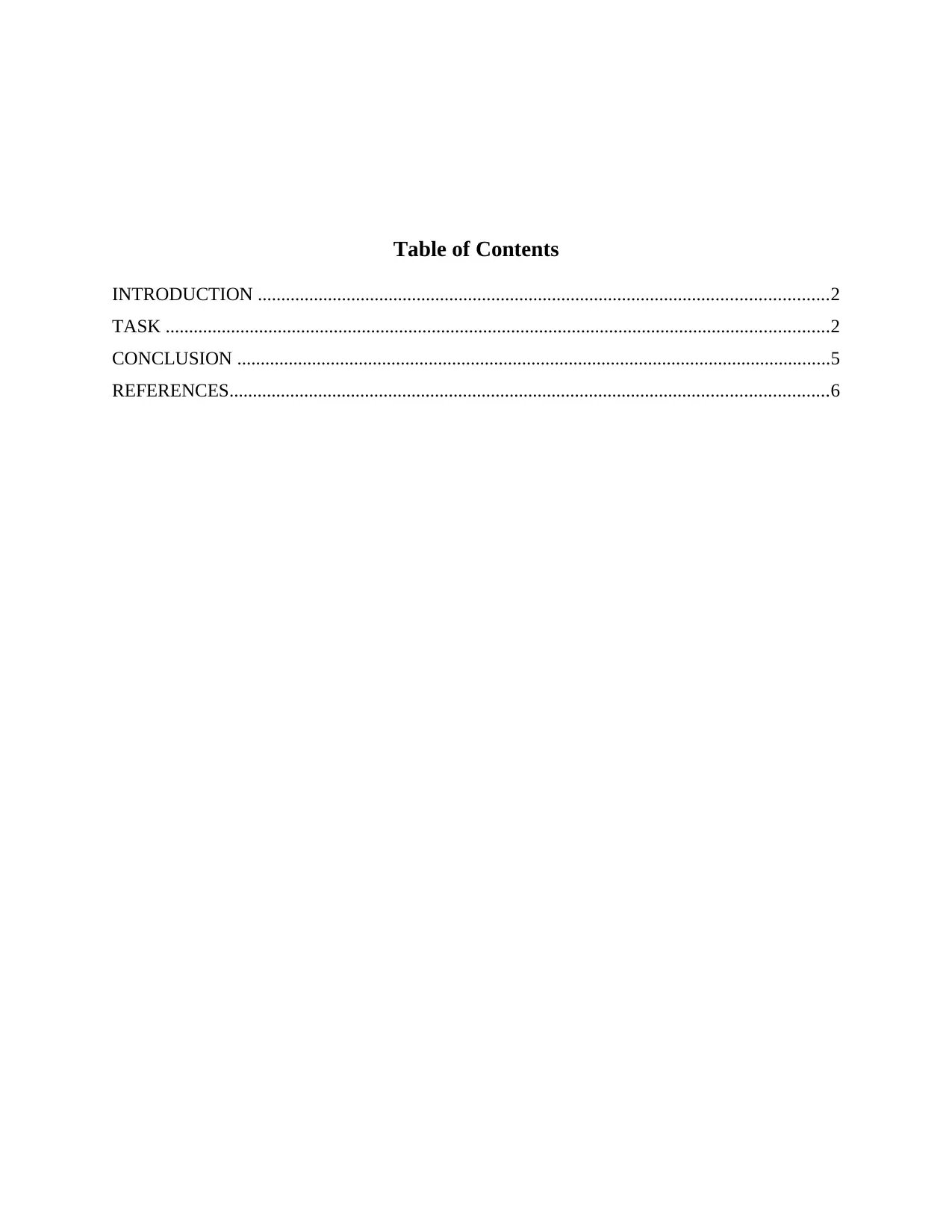
Table of Contents
INTRODUCTION ..........................................................................................................................2
TASK ..............................................................................................................................................2
CONCLUSION ...............................................................................................................................5
REFERENCES................................................................................................................................6
INTRODUCTION ..........................................................................................................................2
TASK ..............................................................................................................................................2
CONCLUSION ...............................................................................................................................5
REFERENCES................................................................................................................................6
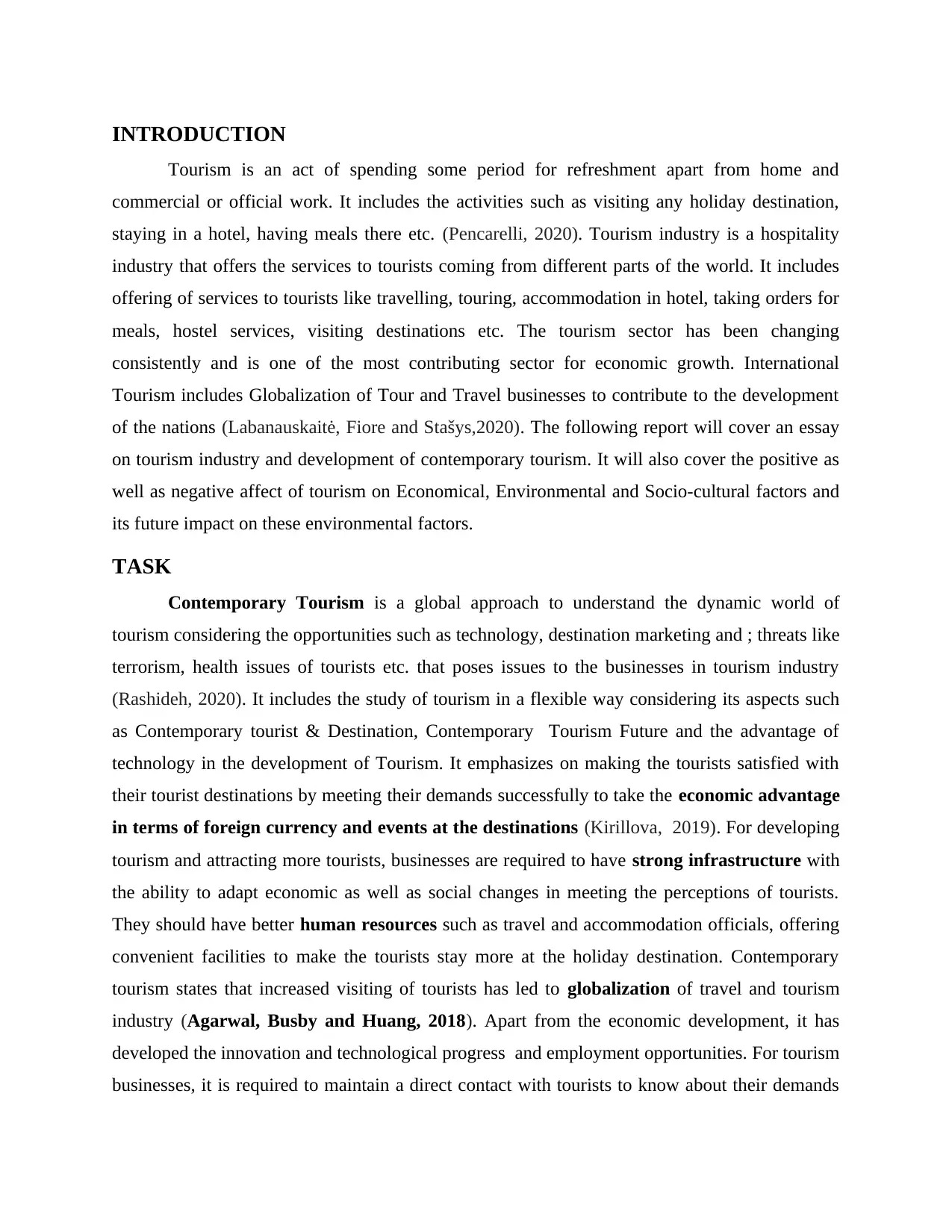
INTRODUCTION
Tourism is an act of spending some period for refreshment apart from home and
commercial or official work. It includes the activities such as visiting any holiday destination,
staying in a hotel, having meals there etc. (Pencarelli, 2020). Tourism industry is a hospitality
industry that offers the services to tourists coming from different parts of the world. It includes
offering of services to tourists like travelling, touring, accommodation in hotel, taking orders for
meals, hostel services, visiting destinations etc. The tourism sector has been changing
consistently and is one of the most contributing sector for economic growth. International
Tourism includes Globalization of Tour and Travel businesses to contribute to the development
of the nations (Labanauskaitė, Fiore and Stašys,2020). The following report will cover an essay
on tourism industry and development of contemporary tourism. It will also cover the positive as
well as negative affect of tourism on Economical, Environmental and Socio-cultural factors and
its future impact on these environmental factors.
TASK
Contemporary Tourism is a global approach to understand the dynamic world of
tourism considering the opportunities such as technology, destination marketing and ; threats like
terrorism, health issues of tourists etc. that poses issues to the businesses in tourism industry
(Rashideh, 2020). It includes the study of tourism in a flexible way considering its aspects such
as Contemporary tourist & Destination, Contemporary Tourism Future and the advantage of
technology in the development of Tourism. It emphasizes on making the tourists satisfied with
their tourist destinations by meeting their demands successfully to take the economic advantage
in terms of foreign currency and events at the destinations (Kirillova, 2019). For developing
tourism and attracting more tourists, businesses are required to have strong infrastructure with
the ability to adapt economic as well as social changes in meeting the perceptions of tourists.
They should have better human resources such as travel and accommodation officials, offering
convenient facilities to make the tourists stay more at the holiday destination. Contemporary
tourism states that increased visiting of tourists has led to globalization of travel and tourism
industry (Agarwal, Busby and Huang, 2018). Apart from the economic development, it has
developed the innovation and technological progress and employment opportunities. For tourism
businesses, it is required to maintain a direct contact with tourists to know about their demands
Tourism is an act of spending some period for refreshment apart from home and
commercial or official work. It includes the activities such as visiting any holiday destination,
staying in a hotel, having meals there etc. (Pencarelli, 2020). Tourism industry is a hospitality
industry that offers the services to tourists coming from different parts of the world. It includes
offering of services to tourists like travelling, touring, accommodation in hotel, taking orders for
meals, hostel services, visiting destinations etc. The tourism sector has been changing
consistently and is one of the most contributing sector for economic growth. International
Tourism includes Globalization of Tour and Travel businesses to contribute to the development
of the nations (Labanauskaitė, Fiore and Stašys,2020). The following report will cover an essay
on tourism industry and development of contemporary tourism. It will also cover the positive as
well as negative affect of tourism on Economical, Environmental and Socio-cultural factors and
its future impact on these environmental factors.
TASK
Contemporary Tourism is a global approach to understand the dynamic world of
tourism considering the opportunities such as technology, destination marketing and ; threats like
terrorism, health issues of tourists etc. that poses issues to the businesses in tourism industry
(Rashideh, 2020). It includes the study of tourism in a flexible way considering its aspects such
as Contemporary tourist & Destination, Contemporary Tourism Future and the advantage of
technology in the development of Tourism. It emphasizes on making the tourists satisfied with
their tourist destinations by meeting their demands successfully to take the economic advantage
in terms of foreign currency and events at the destinations (Kirillova, 2019). For developing
tourism and attracting more tourists, businesses are required to have strong infrastructure with
the ability to adapt economic as well as social changes in meeting the perceptions of tourists.
They should have better human resources such as travel and accommodation officials, offering
convenient facilities to make the tourists stay more at the holiday destination. Contemporary
tourism states that increased visiting of tourists has led to globalization of travel and tourism
industry (Agarwal, Busby and Huang, 2018). Apart from the economic development, it has
developed the innovation and technological progress and employment opportunities. For tourism
businesses, it is required to maintain a direct contact with tourists to know about their demands
⊘ This is a preview!⊘
Do you want full access?
Subscribe today to unlock all pages.

Trusted by 1+ million students worldwide
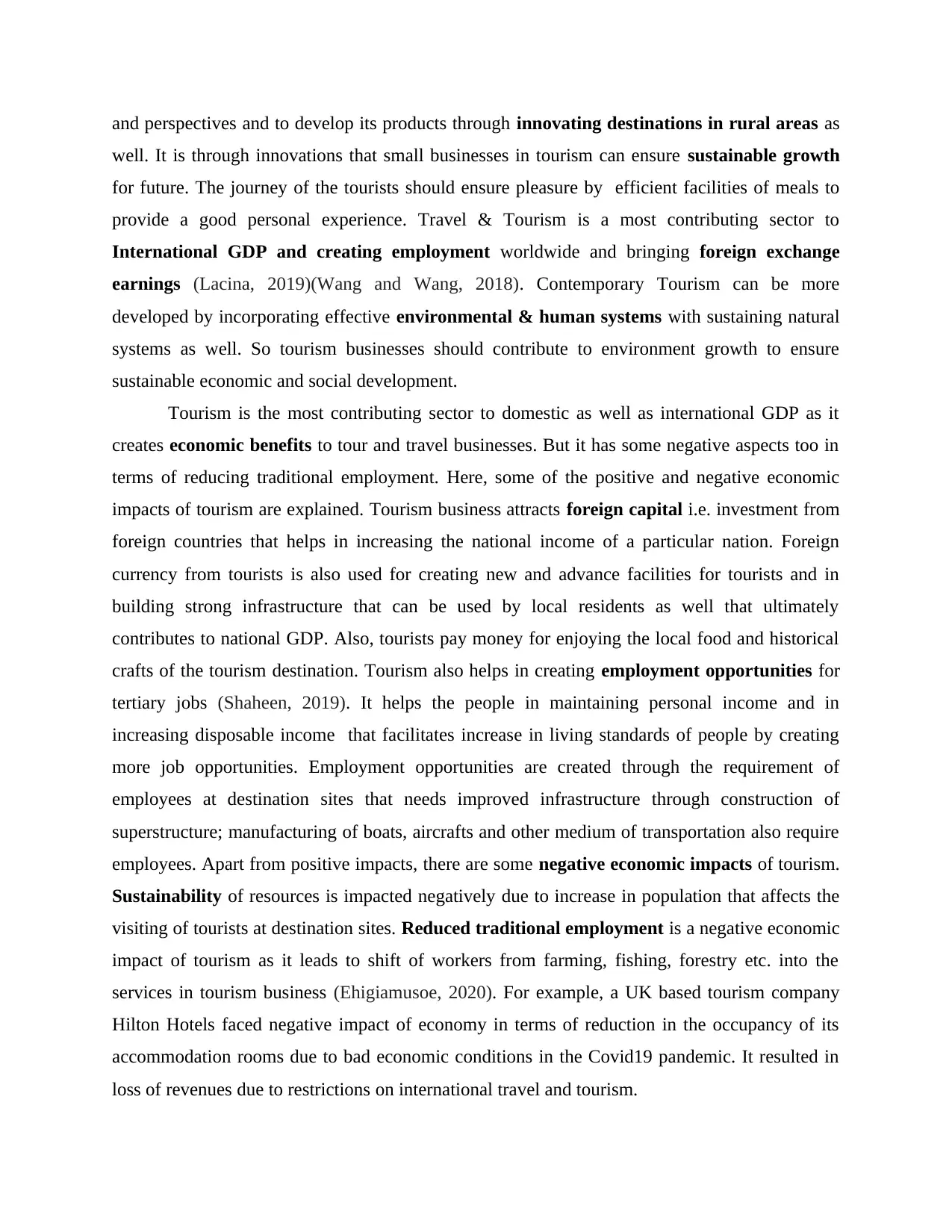
and perspectives and to develop its products through innovating destinations in rural areas as
well. It is through innovations that small businesses in tourism can ensure sustainable growth
for future. The journey of the tourists should ensure pleasure by efficient facilities of meals to
provide a good personal experience. Travel & Tourism is a most contributing sector to
International GDP and creating employment worldwide and bringing foreign exchange
earnings (Lacina, 2019)(Wang and Wang, 2018). Contemporary Tourism can be more
developed by incorporating effective environmental & human systems with sustaining natural
systems as well. So tourism businesses should contribute to environment growth to ensure
sustainable economic and social development.
Tourism is the most contributing sector to domestic as well as international GDP as it
creates economic benefits to tour and travel businesses. But it has some negative aspects too in
terms of reducing traditional employment. Here, some of the positive and negative economic
impacts of tourism are explained. Tourism business attracts foreign capital i.e. investment from
foreign countries that helps in increasing the national income of a particular nation. Foreign
currency from tourists is also used for creating new and advance facilities for tourists and in
building strong infrastructure that can be used by local residents as well that ultimately
contributes to national GDP. Also, tourists pay money for enjoying the local food and historical
crafts of the tourism destination. Tourism also helps in creating employment opportunities for
tertiary jobs (Shaheen, 2019). It helps the people in maintaining personal income and in
increasing disposable income that facilitates increase in living standards of people by creating
more job opportunities. Employment opportunities are created through the requirement of
employees at destination sites that needs improved infrastructure through construction of
superstructure; manufacturing of boats, aircrafts and other medium of transportation also require
employees. Apart from positive impacts, there are some negative economic impacts of tourism.
Sustainability of resources is impacted negatively due to increase in population that affects the
visiting of tourists at destination sites. Reduced traditional employment is a negative economic
impact of tourism as it leads to shift of workers from farming, fishing, forestry etc. into the
services in tourism business (Ehigiamusoe, 2020). For example, a UK based tourism company
Hilton Hotels faced negative impact of economy in terms of reduction in the occupancy of its
accommodation rooms due to bad economic conditions in the Covid19 pandemic. It resulted in
loss of revenues due to restrictions on international travel and tourism.
well. It is through innovations that small businesses in tourism can ensure sustainable growth
for future. The journey of the tourists should ensure pleasure by efficient facilities of meals to
provide a good personal experience. Travel & Tourism is a most contributing sector to
International GDP and creating employment worldwide and bringing foreign exchange
earnings (Lacina, 2019)(Wang and Wang, 2018). Contemporary Tourism can be more
developed by incorporating effective environmental & human systems with sustaining natural
systems as well. So tourism businesses should contribute to environment growth to ensure
sustainable economic and social development.
Tourism is the most contributing sector to domestic as well as international GDP as it
creates economic benefits to tour and travel businesses. But it has some negative aspects too in
terms of reducing traditional employment. Here, some of the positive and negative economic
impacts of tourism are explained. Tourism business attracts foreign capital i.e. investment from
foreign countries that helps in increasing the national income of a particular nation. Foreign
currency from tourists is also used for creating new and advance facilities for tourists and in
building strong infrastructure that can be used by local residents as well that ultimately
contributes to national GDP. Also, tourists pay money for enjoying the local food and historical
crafts of the tourism destination. Tourism also helps in creating employment opportunities for
tertiary jobs (Shaheen, 2019). It helps the people in maintaining personal income and in
increasing disposable income that facilitates increase in living standards of people by creating
more job opportunities. Employment opportunities are created through the requirement of
employees at destination sites that needs improved infrastructure through construction of
superstructure; manufacturing of boats, aircrafts and other medium of transportation also require
employees. Apart from positive impacts, there are some negative economic impacts of tourism.
Sustainability of resources is impacted negatively due to increase in population that affects the
visiting of tourists at destination sites. Reduced traditional employment is a negative economic
impact of tourism as it leads to shift of workers from farming, fishing, forestry etc. into the
services in tourism business (Ehigiamusoe, 2020). For example, a UK based tourism company
Hilton Hotels faced negative impact of economy in terms of reduction in the occupancy of its
accommodation rooms due to bad economic conditions in the Covid19 pandemic. It resulted in
loss of revenues due to restrictions on international travel and tourism.
Paraphrase This Document
Need a fresh take? Get an instant paraphrase of this document with our AI Paraphraser
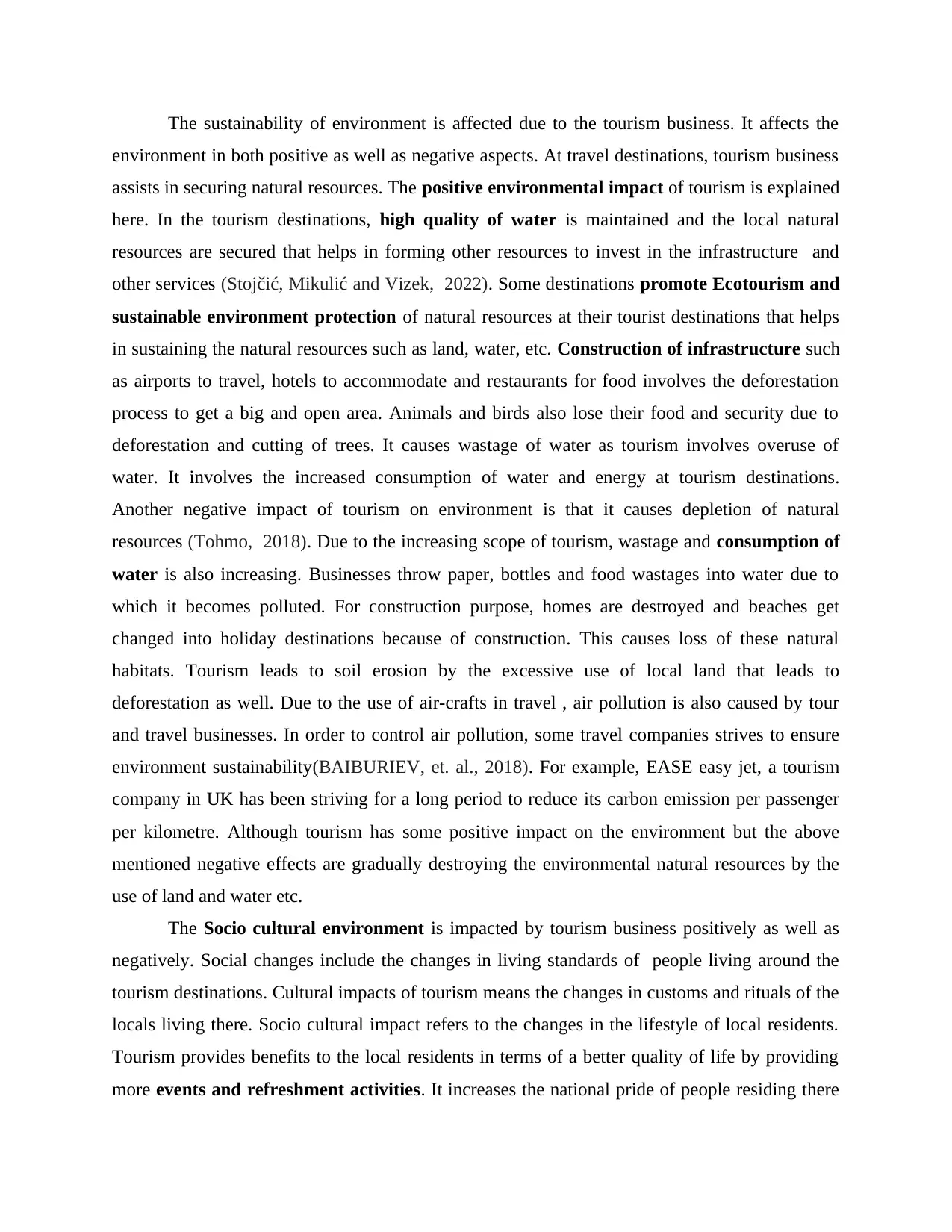
The sustainability of environment is affected due to the tourism business. It affects the
environment in both positive as well as negative aspects. At travel destinations, tourism business
assists in securing natural resources. The positive environmental impact of tourism is explained
here. In the tourism destinations, high quality of water is maintained and the local natural
resources are secured that helps in forming other resources to invest in the infrastructure and
other services (Stojčić, Mikulić and Vizek, 2022). Some destinations promote Ecotourism and
sustainable environment protection of natural resources at their tourist destinations that helps
in sustaining the natural resources such as land, water, etc. Construction of infrastructure such
as airports to travel, hotels to accommodate and restaurants for food involves the deforestation
process to get a big and open area. Animals and birds also lose their food and security due to
deforestation and cutting of trees. It causes wastage of water as tourism involves overuse of
water. It involves the increased consumption of water and energy at tourism destinations.
Another negative impact of tourism on environment is that it causes depletion of natural
resources (Tohmo, 2018). Due to the increasing scope of tourism, wastage and consumption of
water is also increasing. Businesses throw paper, bottles and food wastages into water due to
which it becomes polluted. For construction purpose, homes are destroyed and beaches get
changed into holiday destinations because of construction. This causes loss of these natural
habitats. Tourism leads to soil erosion by the excessive use of local land that leads to
deforestation as well. Due to the use of air-crafts in travel , air pollution is also caused by tour
and travel businesses. In order to control air pollution, some travel companies strives to ensure
environment sustainability(BAIBURIEV, et. al., 2018). For example, EASE easy jet, a tourism
company in UK has been striving for a long period to reduce its carbon emission per passenger
per kilometre. Although tourism has some positive impact on the environment but the above
mentioned negative effects are gradually destroying the environmental natural resources by the
use of land and water etc.
The Socio cultural environment is impacted by tourism business positively as well as
negatively. Social changes include the changes in living standards of people living around the
tourism destinations. Cultural impacts of tourism means the changes in customs and rituals of the
locals living there. Socio cultural impact refers to the changes in the lifestyle of local residents.
Tourism provides benefits to the local residents in terms of a better quality of life by providing
more events and refreshment activities. It increases the national pride of people residing there
environment in both positive as well as negative aspects. At travel destinations, tourism business
assists in securing natural resources. The positive environmental impact of tourism is explained
here. In the tourism destinations, high quality of water is maintained and the local natural
resources are secured that helps in forming other resources to invest in the infrastructure and
other services (Stojčić, Mikulić and Vizek, 2022). Some destinations promote Ecotourism and
sustainable environment protection of natural resources at their tourist destinations that helps
in sustaining the natural resources such as land, water, etc. Construction of infrastructure such
as airports to travel, hotels to accommodate and restaurants for food involves the deforestation
process to get a big and open area. Animals and birds also lose their food and security due to
deforestation and cutting of trees. It causes wastage of water as tourism involves overuse of
water. It involves the increased consumption of water and energy at tourism destinations.
Another negative impact of tourism on environment is that it causes depletion of natural
resources (Tohmo, 2018). Due to the increasing scope of tourism, wastage and consumption of
water is also increasing. Businesses throw paper, bottles and food wastages into water due to
which it becomes polluted. For construction purpose, homes are destroyed and beaches get
changed into holiday destinations because of construction. This causes loss of these natural
habitats. Tourism leads to soil erosion by the excessive use of local land that leads to
deforestation as well. Due to the use of air-crafts in travel , air pollution is also caused by tour
and travel businesses. In order to control air pollution, some travel companies strives to ensure
environment sustainability(BAIBURIEV, et. al., 2018). For example, EASE easy jet, a tourism
company in UK has been striving for a long period to reduce its carbon emission per passenger
per kilometre. Although tourism has some positive impact on the environment but the above
mentioned negative effects are gradually destroying the environmental natural resources by the
use of land and water etc.
The Socio cultural environment is impacted by tourism business positively as well as
negatively. Social changes include the changes in living standards of people living around the
tourism destinations. Cultural impacts of tourism means the changes in customs and rituals of the
locals living there. Socio cultural impact refers to the changes in the lifestyle of local residents.
Tourism provides benefits to the local residents in terms of a better quality of life by providing
more events and refreshment activities. It increases the national pride of people residing there
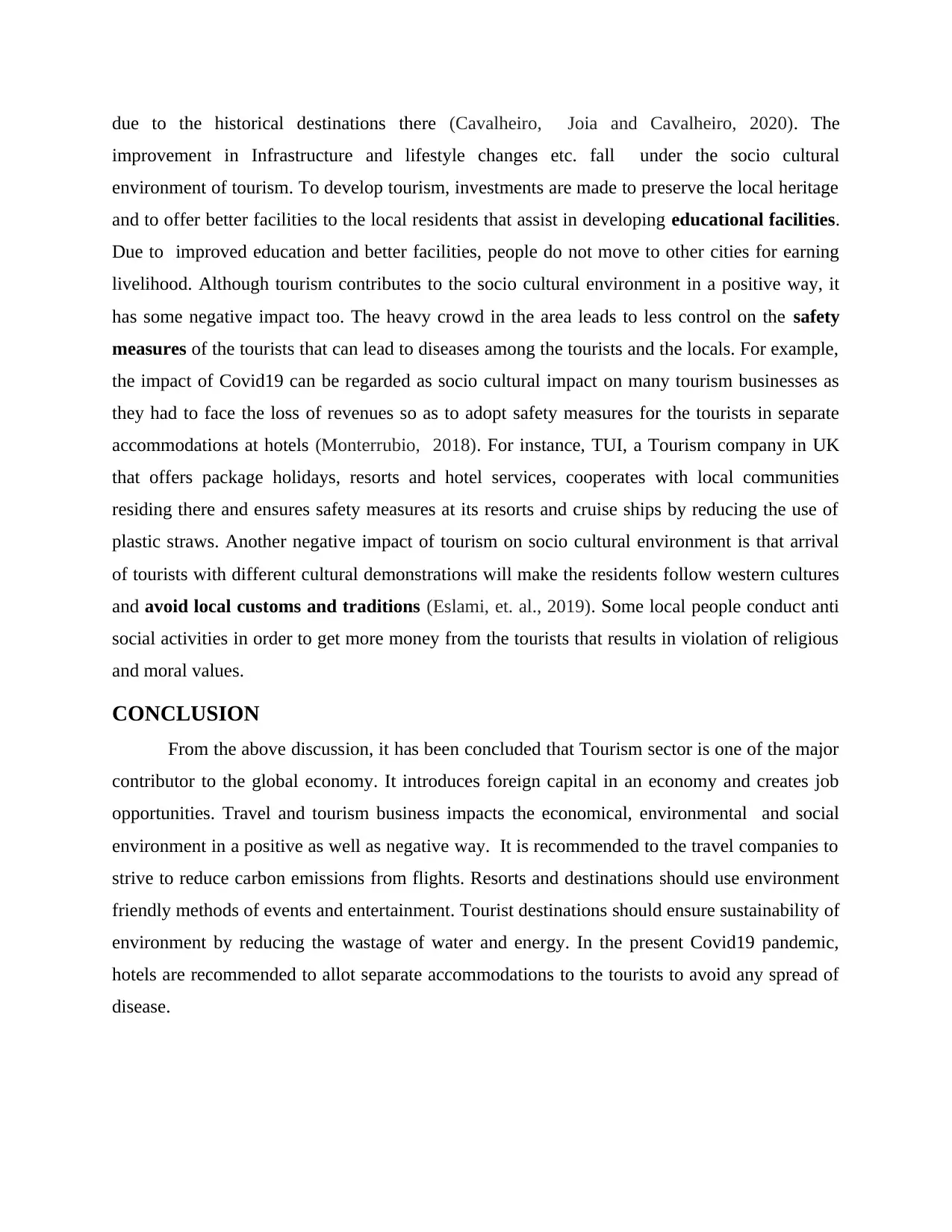
due to the historical destinations there (Cavalheiro, Joia and Cavalheiro, 2020). The
improvement in Infrastructure and lifestyle changes etc. fall under the socio cultural
environment of tourism. To develop tourism, investments are made to preserve the local heritage
and to offer better facilities to the local residents that assist in developing educational facilities.
Due to improved education and better facilities, people do not move to other cities for earning
livelihood. Although tourism contributes to the socio cultural environment in a positive way, it
has some negative impact too. The heavy crowd in the area leads to less control on the safety
measures of the tourists that can lead to diseases among the tourists and the locals. For example,
the impact of Covid19 can be regarded as socio cultural impact on many tourism businesses as
they had to face the loss of revenues so as to adopt safety measures for the tourists in separate
accommodations at hotels (Monterrubio, 2018). For instance, TUI, a Tourism company in UK
that offers package holidays, resorts and hotel services, cooperates with local communities
residing there and ensures safety measures at its resorts and cruise ships by reducing the use of
plastic straws. Another negative impact of tourism on socio cultural environment is that arrival
of tourists with different cultural demonstrations will make the residents follow western cultures
and avoid local customs and traditions (Eslami, et. al., 2019). Some local people conduct anti
social activities in order to get more money from the tourists that results in violation of religious
and moral values.
CONCLUSION
From the above discussion, it has been concluded that Tourism sector is one of the major
contributor to the global economy. It introduces foreign capital in an economy and creates job
opportunities. Travel and tourism business impacts the economical, environmental and social
environment in a positive as well as negative way. It is recommended to the travel companies to
strive to reduce carbon emissions from flights. Resorts and destinations should use environment
friendly methods of events and entertainment. Tourist destinations should ensure sustainability of
environment by reducing the wastage of water and energy. In the present Covid19 pandemic,
hotels are recommended to allot separate accommodations to the tourists to avoid any spread of
disease.
improvement in Infrastructure and lifestyle changes etc. fall under the socio cultural
environment of tourism. To develop tourism, investments are made to preserve the local heritage
and to offer better facilities to the local residents that assist in developing educational facilities.
Due to improved education and better facilities, people do not move to other cities for earning
livelihood. Although tourism contributes to the socio cultural environment in a positive way, it
has some negative impact too. The heavy crowd in the area leads to less control on the safety
measures of the tourists that can lead to diseases among the tourists and the locals. For example,
the impact of Covid19 can be regarded as socio cultural impact on many tourism businesses as
they had to face the loss of revenues so as to adopt safety measures for the tourists in separate
accommodations at hotels (Monterrubio, 2018). For instance, TUI, a Tourism company in UK
that offers package holidays, resorts and hotel services, cooperates with local communities
residing there and ensures safety measures at its resorts and cruise ships by reducing the use of
plastic straws. Another negative impact of tourism on socio cultural environment is that arrival
of tourists with different cultural demonstrations will make the residents follow western cultures
and avoid local customs and traditions (Eslami, et. al., 2019). Some local people conduct anti
social activities in order to get more money from the tourists that results in violation of religious
and moral values.
CONCLUSION
From the above discussion, it has been concluded that Tourism sector is one of the major
contributor to the global economy. It introduces foreign capital in an economy and creates job
opportunities. Travel and tourism business impacts the economical, environmental and social
environment in a positive as well as negative way. It is recommended to the travel companies to
strive to reduce carbon emissions from flights. Resorts and destinations should use environment
friendly methods of events and entertainment. Tourist destinations should ensure sustainability of
environment by reducing the wastage of water and energy. In the present Covid19 pandemic,
hotels are recommended to allot separate accommodations to the tourists to avoid any spread of
disease.
⊘ This is a preview!⊘
Do you want full access?
Subscribe today to unlock all pages.

Trusted by 1+ million students worldwide
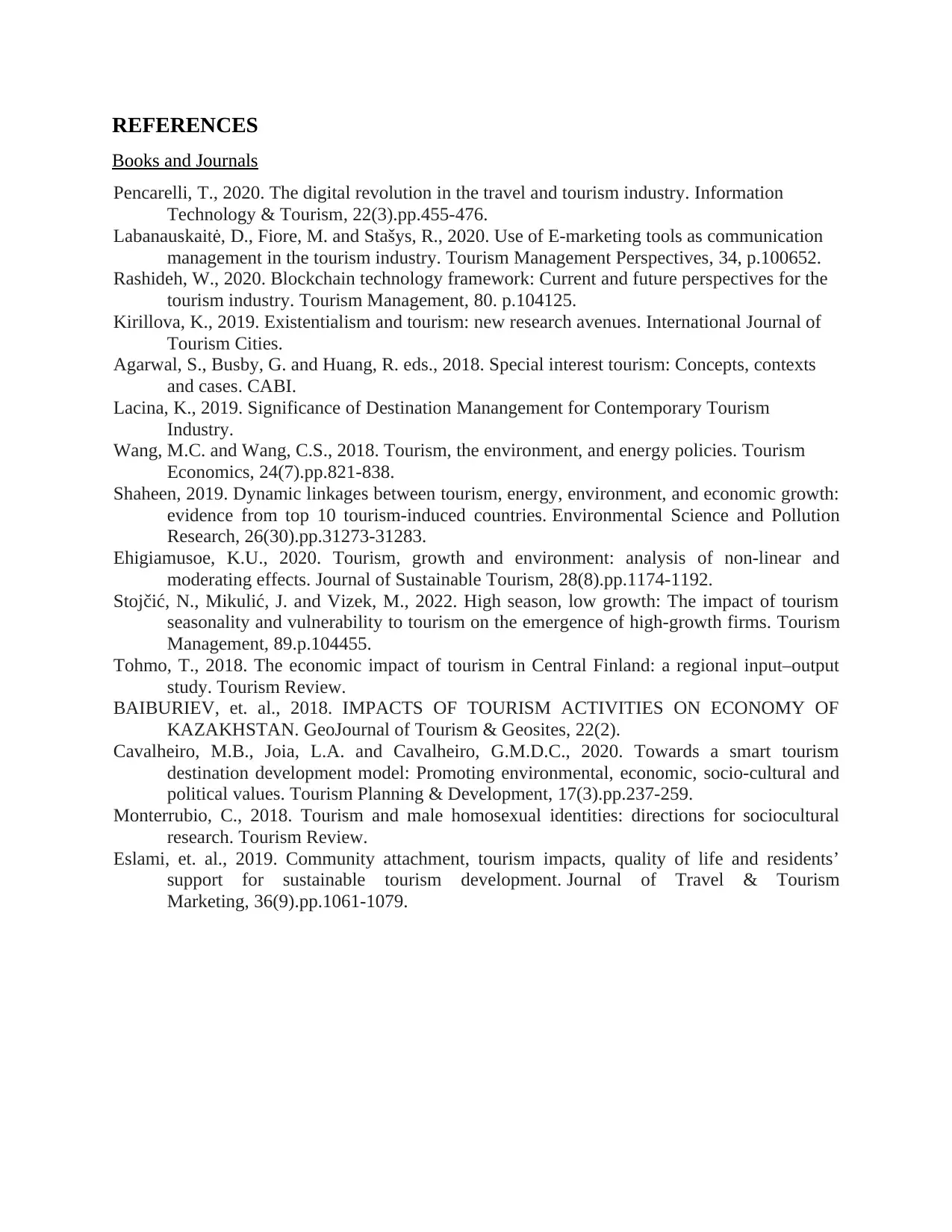
REFERENCES
Books and Journals
Pencarelli, T., 2020. The digital revolution in the travel and tourism industry. Information
Technology & Tourism, 22(3).pp.455-476.
Labanauskaitė, D., Fiore, M. and Stašys, R., 2020. Use of E-marketing tools as communication
management in the tourism industry. Tourism Management Perspectives, 34, p.100652.
Rashideh, W., 2020. Blockchain technology framework: Current and future perspectives for the
tourism industry. Tourism Management, 80. p.104125.
Kirillova, K., 2019. Existentialism and tourism: new research avenues. International Journal of
Tourism Cities.
Agarwal, S., Busby, G. and Huang, R. eds., 2018. Special interest tourism: Concepts, contexts
and cases. CABI.
Lacina, K., 2019. Significance of Destination Manangement for Contemporary Tourism
Industry.
Wang, M.C. and Wang, C.S., 2018. Tourism, the environment, and energy policies. Tourism
Economics, 24(7).pp.821-838.
Shaheen, 2019. Dynamic linkages between tourism, energy, environment, and economic growth:
evidence from top 10 tourism-induced countries. Environmental Science and Pollution
Research, 26(30).pp.31273-31283.
Ehigiamusoe, K.U., 2020. Tourism, growth and environment: analysis of non-linear and
moderating effects. Journal of Sustainable Tourism, 28(8).pp.1174-1192.
Stojčić, N., Mikulić, J. and Vizek, M., 2022. High season, low growth: The impact of tourism
seasonality and vulnerability to tourism on the emergence of high-growth firms. Tourism
Management, 89.p.104455.
Tohmo, T., 2018. The economic impact of tourism in Central Finland: a regional input–output
study. Tourism Review.
BAIBURIEV, et. al., 2018. IMPACTS OF TOURISM ACTIVITIES ON ECONOMY OF
KAZAKHSTAN. GeoJournal of Tourism & Geosites, 22(2).
Cavalheiro, M.B., Joia, L.A. and Cavalheiro, G.M.D.C., 2020. Towards a smart tourism
destination development model: Promoting environmental, economic, socio-cultural and
political values. Tourism Planning & Development, 17(3).pp.237-259.
Monterrubio, C., 2018. Tourism and male homosexual identities: directions for sociocultural
research. Tourism Review.
Eslami, et. al., 2019. Community attachment, tourism impacts, quality of life and residents’
support for sustainable tourism development. Journal of Travel & Tourism
Marketing, 36(9).pp.1061-1079.
Books and Journals
Pencarelli, T., 2020. The digital revolution in the travel and tourism industry. Information
Technology & Tourism, 22(3).pp.455-476.
Labanauskaitė, D., Fiore, M. and Stašys, R., 2020. Use of E-marketing tools as communication
management in the tourism industry. Tourism Management Perspectives, 34, p.100652.
Rashideh, W., 2020. Blockchain technology framework: Current and future perspectives for the
tourism industry. Tourism Management, 80. p.104125.
Kirillova, K., 2019. Existentialism and tourism: new research avenues. International Journal of
Tourism Cities.
Agarwal, S., Busby, G. and Huang, R. eds., 2018. Special interest tourism: Concepts, contexts
and cases. CABI.
Lacina, K., 2019. Significance of Destination Manangement for Contemporary Tourism
Industry.
Wang, M.C. and Wang, C.S., 2018. Tourism, the environment, and energy policies. Tourism
Economics, 24(7).pp.821-838.
Shaheen, 2019. Dynamic linkages between tourism, energy, environment, and economic growth:
evidence from top 10 tourism-induced countries. Environmental Science and Pollution
Research, 26(30).pp.31273-31283.
Ehigiamusoe, K.U., 2020. Tourism, growth and environment: analysis of non-linear and
moderating effects. Journal of Sustainable Tourism, 28(8).pp.1174-1192.
Stojčić, N., Mikulić, J. and Vizek, M., 2022. High season, low growth: The impact of tourism
seasonality and vulnerability to tourism on the emergence of high-growth firms. Tourism
Management, 89.p.104455.
Tohmo, T., 2018. The economic impact of tourism in Central Finland: a regional input–output
study. Tourism Review.
BAIBURIEV, et. al., 2018. IMPACTS OF TOURISM ACTIVITIES ON ECONOMY OF
KAZAKHSTAN. GeoJournal of Tourism & Geosites, 22(2).
Cavalheiro, M.B., Joia, L.A. and Cavalheiro, G.M.D.C., 2020. Towards a smart tourism
destination development model: Promoting environmental, economic, socio-cultural and
political values. Tourism Planning & Development, 17(3).pp.237-259.
Monterrubio, C., 2018. Tourism and male homosexual identities: directions for sociocultural
research. Tourism Review.
Eslami, et. al., 2019. Community attachment, tourism impacts, quality of life and residents’
support for sustainable tourism development. Journal of Travel & Tourism
Marketing, 36(9).pp.1061-1079.
1 out of 7
Related Documents
Your All-in-One AI-Powered Toolkit for Academic Success.
+13062052269
info@desklib.com
Available 24*7 on WhatsApp / Email
![[object Object]](/_next/static/media/star-bottom.7253800d.svg)
Unlock your academic potential
Copyright © 2020–2026 A2Z Services. All Rights Reserved. Developed and managed by ZUCOL.




